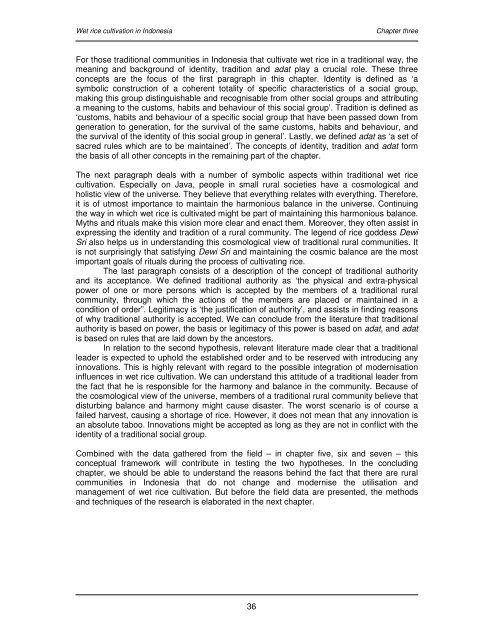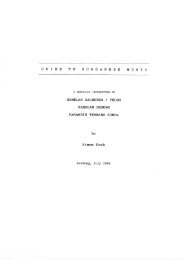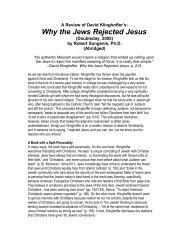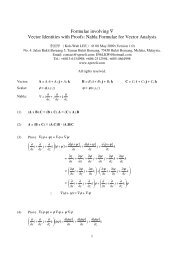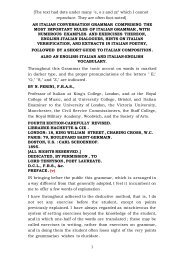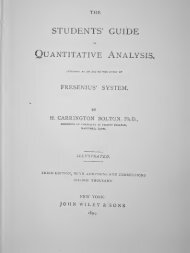Wet rice cultivation in Indonesia - Free EBooks Library
Wet rice cultivation in Indonesia - Free EBooks Library
Wet rice cultivation in Indonesia - Free EBooks Library
Create successful ePaper yourself
Turn your PDF publications into a flip-book with our unique Google optimized e-Paper software.
<strong>Wet</strong> <strong>rice</strong> <strong>cultivation</strong> <strong>in</strong> <strong>Indonesia</strong> Chapter three<br />
For those traditional communities <strong>in</strong> <strong>Indonesia</strong> that cultivate wet <strong>rice</strong> <strong>in</strong> a traditional way, the<br />
mean<strong>in</strong>g and background of identity, tradition and adat play a crucial role. These three<br />
concepts are the focus of the first paragraph <strong>in</strong> this chapter. Identity is def<strong>in</strong>ed as ‘a<br />
symbolic construction of a coherent totality of specific characteristics of a social group,<br />
mak<strong>in</strong>g this group dist<strong>in</strong>guishable and recognisable from other social groups and attribut<strong>in</strong>g<br />
a mean<strong>in</strong>g to the customs, habits and behaviour of this social group’. Tradition is def<strong>in</strong>ed as<br />
‘customs, habits and behaviour of a specific social group that have been passed down from<br />
generation to generation, for the survival of the same customs, habits and behaviour, and<br />
the survival of the identity of this social group <strong>in</strong> general’. Lastly, we def<strong>in</strong>ed adat as ‘a set of<br />
sacred rules which are to be ma<strong>in</strong>ta<strong>in</strong>ed’. The concepts of identity, tradition and adat form<br />
the basis of all other concepts <strong>in</strong> the rema<strong>in</strong><strong>in</strong>g part of the chapter.<br />
The next paragraph deals with a number of symbolic aspects with<strong>in</strong> traditional wet <strong>rice</strong><br />
<strong>cultivation</strong>. Especially on Java, people <strong>in</strong> small rural societies have a cosmological and<br />
holistic view of the universe. They believe that everyth<strong>in</strong>g relates with everyth<strong>in</strong>g. Therefore,<br />
it is of utmost importance to ma<strong>in</strong>ta<strong>in</strong> the harmonious balance <strong>in</strong> the universe. Cont<strong>in</strong>u<strong>in</strong>g<br />
the way <strong>in</strong> which wet <strong>rice</strong> is cultivated might be part of ma<strong>in</strong>ta<strong>in</strong><strong>in</strong>g this harmonious balance.<br />
Myths and rituals make this vision more clear and enact them. Moreover, they often assist <strong>in</strong><br />
express<strong>in</strong>g the identity and tradition of a rural community. The legend of <strong>rice</strong> goddess Dewi<br />
Sri also helps us <strong>in</strong> understand<strong>in</strong>g this cosmological view of traditional rural communities. It<br />
is not surpris<strong>in</strong>gly that satisfy<strong>in</strong>g Dewi Sri and ma<strong>in</strong>ta<strong>in</strong><strong>in</strong>g the cosmic balance are the most<br />
important goals of rituals dur<strong>in</strong>g the process of cultivat<strong>in</strong>g <strong>rice</strong>.<br />
The last paragraph consists of a description of the concept of traditional authority<br />
and its acceptance. We def<strong>in</strong>ed traditional authority as ‘the physical and extra-physical<br />
power of one or more persons which is accepted by the members of a traditional rural<br />
community, through which the actions of the members are placed or ma<strong>in</strong>ta<strong>in</strong>ed <strong>in</strong> a<br />
condition of order”. Legitimacy is ‘the justification of authority’, and assists <strong>in</strong> f<strong>in</strong>d<strong>in</strong>g reasons<br />
of why traditional authority is accepted. We can conclude from the literature that traditional<br />
authority is based on power, the basis or legitimacy of this power is based on adat, and adat<br />
is based on rules that are laid down by the ancestors.<br />
In relation to the second hypothesis, relevant literature made clear that a traditional<br />
leader is expected to uphold the established order and to be reserved with <strong>in</strong>troduc<strong>in</strong>g any<br />
<strong>in</strong>novations. This is highly relevant with regard to the possible <strong>in</strong>tegration of modernisation<br />
<strong>in</strong>fluences <strong>in</strong> wet <strong>rice</strong> <strong>cultivation</strong>. We can understand this attitude of a traditional leader from<br />
the fact that he is responsible for the harmony and balance <strong>in</strong> the community. Because of<br />
the cosmological view of the universe, members of a traditional rural community believe that<br />
disturb<strong>in</strong>g balance and harmony might cause disaster. The worst scenario is of course a<br />
failed harvest, caus<strong>in</strong>g a shortage of <strong>rice</strong>. However, it does not mean that any <strong>in</strong>novation is<br />
an absolute taboo. Innovations might be accepted as long as they are not <strong>in</strong> conflict with the<br />
identity of a traditional social group.<br />
Comb<strong>in</strong>ed with the data gathered from the field – <strong>in</strong> chapter five, six and seven – this<br />
conceptual framework will contribute <strong>in</strong> test<strong>in</strong>g the two hypotheses. In the conclud<strong>in</strong>g<br />
chapter, we should be able to understand the reasons beh<strong>in</strong>d the fact that there are rural<br />
communities <strong>in</strong> <strong>Indonesia</strong> that do not change and modernise the utilisation and<br />
management of wet <strong>rice</strong> <strong>cultivation</strong>. But before the field data are presented, the methods<br />
and techniques of the research is elaborated <strong>in</strong> the next chapter.<br />
36


